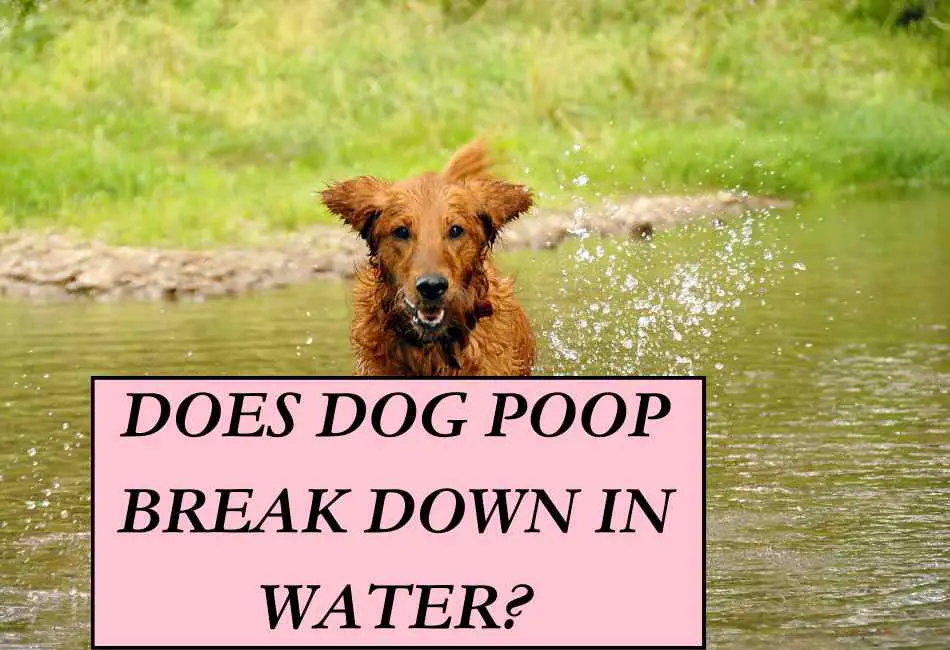As seemingly indifferent as it may seem, the question, “Does dog poop break down in water?” holds more relevance than one might initially anticipate.
This matter pertains to everyone, dog owners and non-owners alike, as it touches on the broader issue of water pollution.
Understanding how dog waste decomposes in water is crucial because pet waste significantly contributes to water contamination.
It’s not just about keeping our sidewalks clean; it’s about ensuring the water we use daily – for drinking, cooking, bathing, and the environment’s overall health – isn’t polluted by harmful pathogens from animal waste.
Emphasizing the importance of responsible pet waste disposal isn’t just about neighborhood cleanliness; it’s a public health matter.
So, let’s dive in and unravel the science behind the decomposition of dog poop in water.
Decomposition of Dog Poop in Water
As a dedicated dog owner, I’ve spent my fair share of time contemplating the finer details of dog poop.
You wouldn’t believe the amount of science that goes into decomposition! Once the poo hits the water, it begins to break down into smaller particles.
This happens through natural processes, including chemical and biological transformations.
As these particles disperse, the waste’s harmful bacteria and pathogens mix into the water – a major contributor to pollution.
Factors Influencing the Breakdown of Dog Poop
Several factors influence how quickly Fido’s feces break down in water.
- Water Temperature
Similar to my first chilly dive into the local swimming pool, bacteria in dog poop respond to water temperature.
Cold water slows down their metabolic processes, meaning it takes longer for the poop to decompose.
In contrast, warm water speeds up decomposition, serving as a turbo boost to the bacteria.
- Microbial Activity
Microbial activity is like the life of the decomposition party. A high level of microbes means more partygoers breaking down the poop.
Low microbial activity? You’ve got a less crowded party, and decomposition happens slower.
- Oxygen Levels
Just as we need oxygen to breathe, so do many of the microorganisms that break down dog poop. High oxygen levels in the water can accelerate the decomposition process.
But if the water is low on oxygen, it’s like trying to run a marathon with a blocked nose – the process becomes much slower.
Timeframe for Decomposition
The exact timeframe for dog poop to completely decompose in water can vary widely, depending on the aforementioned factors.
From my experience, it can take anywhere from weeks to months or even years in colder environments.
However, the danger to our water quality remains as long as the poop is present, underscoring the importance of responsible pet waste disposal.
Pathogens in Dog Poop and Water Contamination
Contrary to what my old neighbor Mr. Jenkins might think, the issue with dog poop in water isn’t just about the unpleasant floating bits. The real troublemaker is the invisible villains – the pathogens.
Pathogens in Animal Waste
Pathogens are disease-causing microorganisms, effectively the bad guys of the bacteria world.
They are present in abundance in animal waste, including dog poop. E. coli, salmonella, and giardia are usually suspects in Fido’s droppings.
Survival of Pathogens in Water
These pathogens are hardy fellas, capable of surviving in water for extended periods. Think of them like the uninvited guests who overstay their welcome at your party – and proceed to make everyone sick.
The warmer the water, the more comfortable they feel, with some pathogens able to stick around for months in favorable conditions.
Health Risks Associated with Contaminated Water
When humans or animals come into contact with contaminated water, they risk many health problems.
From stomach upsets to severe infections, the consequences can be dire. Trust me, I learned this the hard way when I contracted giardiasis from a seemingly pristine mountain stream.
Prevention and Mitigation Strategies
Luckily, we aren’t helpless in the face of this problem. There are several things we can do to protect our waterways from dog poop pollution.
Responsible Pet Ownership
- Proper Disposal of Dog Poop
The first step is to always clean up after your dog. I can’t count how many times I’ve had to remind my forgetful friend Bob about this. It might seem like a hassle, but it’s crucial to preventing contamination.
- Use of Biodegradable Poop Bags
Not all poop bags are created equal. I’ve switched to biodegradable bags to reduce my plastic footprint, and I recommend you do the same.
Conclusion
As I’ve delved into this topic, it’s become evident that Fido’s droppings aren’t as harmless as they seem.
With an unnerving presence of pathogens like E. coli, salmonella, and giardia, dog poop can pollute our water and create serious health risks.
These stubborn pathogens can stick around in the water for months, just like my cousin Larry at a family gathering – except they’re potentially much more harmful.
While we love our furry companions, we must confront the damaging impact their waste can have on our precious water resources.

